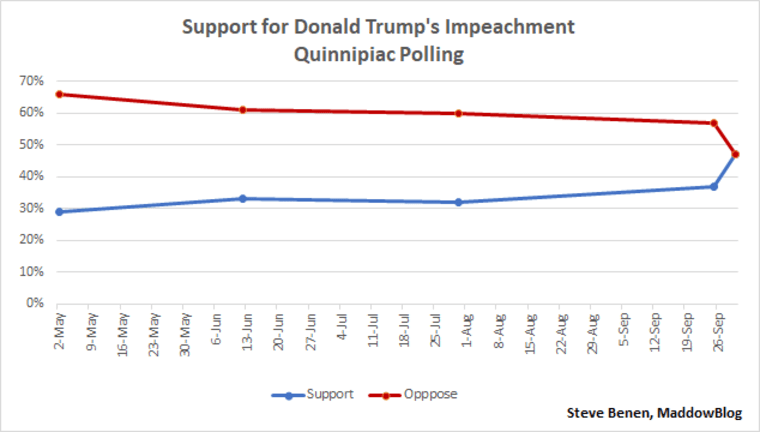
Donald Trump highlighted the results of a "poll" via Twitter last night, which was the sort of thing to bring tears to the eyes of those who take social-science methodology seriously. In this case, a right-wing website asked its right-wing readers whether they "stand with President Trump," and wouldn't you know it, nearly 98% of respondents sided with the Republican.
This, in Trump's mind, is apparently something to be proud of. Meanwhile, in reality, real polling is producing results the president doesn't want to see.
Late last week, an NPR/PBS NewsHour/Marist Poll found a plurality of Americans expressing support for congressional Democrats' decision to start an impeachment inquiry into Trump. A new CNN poll found very similar results.
As for Quinnipiac, just last week, it found 37% of Americans endorsing Trump's impeachment and removal from office, while 57% disagreed. The results are quite different now.
American voters are divided on impeaching and removing President Trump from office, 47 - 47 percent - closing a 20-point gap from less than a week ago, according to a Quinnipiac University Poll released today. In the poll released on September 25th, voters said that the president should not be impeached and removed 57 - 37 percent. [...]While voters are split on impeaching and removing President Trump from office, a slim majority of registered voters do approve of the impeachment inquiry opened by the U.S. House of Representatives 52 - 45 percent. Approval includes half of independents, who are split 50 - 45 percent on the inquiry.
Not surprisingly, there's an enormous gap among partisans -- the overwhelming majority of Democratic voters support impeachment and removal, while the overwhelming majority of Republican voters disagree -- but support has grown among Democrats, Republicans, and independents.
I put together the chart featured above to show the shift in public attitudes over the last several months.
Quinnipiac's data also found that a 56% majority believe Trump sees himself as above the law, while a 54% majority believe the president abuses the power of his office.
As for what's driving the shift in attitudes, let's circle back to last week's coverage, because there are two broad schools of thought.
The first is that the shift among Democratic officials has helped change many voters’ minds. When the party was divided, many of the party’s voters followed suit, waiting for some kind of Democratic consensus to take shape. Once that happened this week, the argument goes, elements of the public responded in kind.
And while there may be some truth to that, I’m even more persuaded by the other explanation: public attitudes started changing when the circumstances changed. This isn’t a political landscape in which Americans reconsidered the Russia scandal and Robert Mueller’s findings and drew new conclusions; it’s one in which a devastating new scandal emerged featuring a president who was caught trying to get a foreign government to help his re-election campaign.
To state the painfully obvious, the latest data is a brief snapshot in time, and attitudes on Trump’s impeachment will invariably change. Stuart Rothenberg warned the other day, “Polling in the middle of a political hurricane is ridiculous,” and he has a point. Events are unfolding quickly, with new revelations coming to the fore, seemingly every few hours.
That said, Democratic lawmakers care how the electorate feels about this process, and the stronger the support for presidential impeachment, the stronger Democratic spines will be.